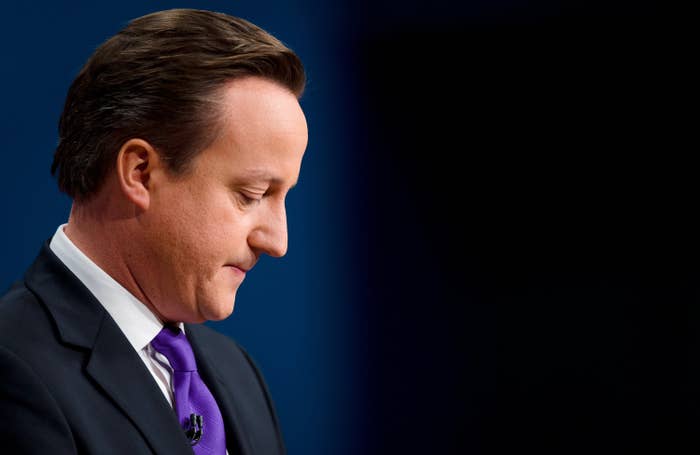
The Guardian’s editor, Katharine Viner, sent a text message to former prime minister David Cameron personally apologising for her newspaper’s editorial that used the death of his young son to attack his "privilege", BuzzFeed News has learned.
Viner sent the message on Monday morning after the Guardian published a widely condemned editorial that claimed Cameron had only ever suffered “privileged pain” in his life.
Guardian staff were also told on Monday morning that the news outlet's management would conduct an internal inquiry into the publication of the "Guardian view" comment.
The editorial about the former prime minister’s memoir was published online on Sunday night. Screenshots of one paragraph which referred to the tragic death of Cameron’s son Ivan immediately went viral on Twitter.
The now-deleted passage said Cameron had known “pain and failure” but it had always been “limited failure and privileged pain”: “Even (Cameron’s) experience of the NHS, which looked after his severely disabled son, has been that of the better functioning and better funded parts of the system.”
In his new memoir, the former prime minister writes about the death of his son Ivan, who was severely disabled, in 2009, and extracts of those passages were published in the Sunday Times at the weekend.
In what appears to be a further dig directed at Cameron, the editorial was originally headlined: “The Guardian’s view on David Cameron: the boy in the bubble.”

But shortly before 7pm on Sunday night, Randeep Ramesh, the newspaper’s chief leader writer responsible for editorials, tweeted a link to the piece, with the original headline.
Within a few hours, amid widespread condemnation on social media, the paragraph had been removed, the headline changed and the Guardian issued an apology through a spokesperson.
"The original version of this editorial posted online fell far short of our standards. It has now been amended, and we apologise completely,” the statement read.

On Sunday night and into Monday, the editorial was criticised by journalists, commentators and MPs. The chancellor, Sajid Javid, tweeted “never has an editorial so lacked in empathy, while so righteously criticising others for lacking it”.
As Guardian journalists arrived at work on Monday, sources say many were “stunned” and “flabbergasted” not only that the piece had been published, but that it had come from the small group of senior writers and editors who craft the paper’s leader columns.
Viner was not at the newspaper’s morning conference so it was left to the retiring deputy editor, Paul Johnson, to address the controversy, which by Monday had gone from Twitter to the BBC’s main radio news bulletins.
According to a source present, Johnson told journalists across the company that there was “no debate” to be had about the editorial, and it was “awful and we’ve apologised unreservedly”.
Johnson told staff that management would be talking to everyone involved in the production of the editorial to find out how it came to be published. A Guardian spokesperson said “there is a pretty thorough set of internal conversations going on about this”.
But the last 24 hours have been dominated by questions in the newsroom about who actually wrote the editorial, and how it got through several other editorial layers to finally being published.
It’s unclear of the exact details of what went into the production of the piece, but one Guardian source said the entire ordeal was down to a rogue writer and a second editor who was careless.
The source said one journalist wrote the piece, while another “read over it but not properly, they rushed, and so it was a fuck up”.
“No one is fine with it,” they added.
The Guardian refused to comment further on how the newspaper was responding to the column, including responding to questions about Viner’s role and that of the readers editor Paul Chadwick. BuzzFeed News has also sent questions to Chadwick about the column.
